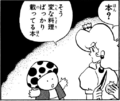Super Mario 4koma Manga Theater: Difference between revisions
(fixed the final sentence) |
m (Text replacement - "''Mario''-" to "''Super Mario''-") |
||
| (5 intermediate revisions by 3 users not shown) | |||
| Line 1: | Line 1: | ||
{{another language}} | {{another language}} | ||
{{italic title}} | {{italic title}} | ||
'''''Super Mario 4koma Manga Theater''''' is a Japan-exclusive series of | {{Rewrite-expand|Overview of cast, format, humor style, etc.; Include more information about individual volumes}} | ||
'''''Super Mario 4koma Manga Theater''''' is a Japan-exclusive series of manga covering several ''[[Super Mario (franchise)|Super Mario]]'' games. The series is a collaboration between various artists. Various ''Super Mario'' characters appear, including [[Mario]], [[Luigi]], [[Princess Peach]], [[Bowser]], and [[Wario]]. The manga also deals with various games such as ''[[Super Mario Kart]]'', ''[[Super Mario World]]'', and ''[[Super Mario Land 2: 6 Golden Coins]]'', the last of which is also the source of the official artwork seen on the front cover. Unlike other ''Super Mario''-related mangas, this manga does not follow a story; instead, each page follows a {{wp|Yonkoma}} format of telling a comedic story within four panels. The first few pages of the books are in full color, while the rest of the pages are in grayscale. The manga ran from 1991 to 1997, and received eleven different books. | |||
Two | Two other series of books exist with the same premise and similar titles, named ''[[4koma Manga Ōkoku]]'' (1991-2002) and ''[[4koma Gag Battle]]'' (1995-2004). | ||
==Covers== | ==Covers== | ||
| Line 50: | Line 51: | ||
</gallery> | </gallery> | ||
{{ | {{Publications}} | ||
[[Category:Comics]] | [[Category:Comics]] | ||
[[it:Super Mario 4koma Manga Theater]] | [[it:Super Mario 4koma Manga Theater]] | ||
Latest revision as of 21:33, May 28, 2023
The title of this article is official, but it comes from a non-English source. If an acceptable English source is found, then the article should be moved to its appropriate title.
It has been requested that this article be rewritten and expanded to include more information. Reason: Overview of cast, format, humor style, etc.; Include more information about individual volumes
Super Mario 4koma Manga Theater is a Japan-exclusive series of manga covering several Super Mario games. The series is a collaboration between various artists. Various Super Mario characters appear, including Mario, Luigi, Princess Peach, Bowser, and Wario. The manga also deals with various games such as Super Mario Kart, Super Mario World, and Super Mario Land 2: 6 Golden Coins, the last of which is also the source of the official artwork seen on the front cover. Unlike other Super Mario-related mangas, this manga does not follow a story; instead, each page follows a Yonkoma format of telling a comedic story within four panels. The first few pages of the books are in full color, while the rest of the pages are in grayscale. The manga ran from 1991 to 1997, and received eleven different books.
Two other series of books exist with the same premise and similar titles, named 4koma Manga Ōkoku (1991-2002) and 4koma Gag Battle (1995-2004).





























